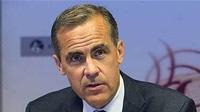
The Bank of England’s monetary policy committee has voted to increase interest rates for the first time in a decade.
The rise takes the interest rate up by a quarter of a percentage point to 0.5%, with early indications of two similar rises planned over the coming years.
This is intended to help curb inflation, which is above the 2% target at 3%, affected by factors including the fall in the value of sterling and rising energy prices.
In a statement, the committee said: “The MPC’s projections are conditioned on the average of a range of possible outcomes for the United Kingdom’s eventual trading relationship with the European Union.
“The projections also assume that, in the interim, households and companies base their decisions on the expectation of a smooth adjustment to that new trading relationship.”
It added that the decision to leave the European Union is having a “noticeable impact” on the economic outlook.
It said the overshoot of inflation throughout its forecast mainly reflects the effects on import prices of the referendum-related fall in sterling.
The committee added: “Uncertainties associated with Brexit are weighing on domestic activity, which has slowed even as global growth has risen significantly. And Brexit-related constraints on investment and labour supply appear to be reinforcing the marked slowdown that has been increasingly evident in recent years in the rate at which the economy can grow without generating inflationary pressures.”
It pointed out that while monetary policy will aim to support the economy through the Brexit process, it “cannot prevent either the necessary real adjustment as the United Kingdom moves towards its new international trading arrangements or the weaker real income growth that is likely to accompany that adjustment over the next few years”.
Despite this, Bank of England governor Mark Carney indicated there was strength in the economy to justify the rate move.
He said: “With unemployment at a 42-year low, inflation above target and growth just above its new, lower speed limit, the time has come to ease our foot off the accelerator.”
Robert Gordon, CEO of Hitachi Capital UK, said the announcement signalled growing confidence in the UK and global economy.
He said: “Ultimately, the BoE had to balance economic growth with the need to reduce inflation and although there are concerns this could curb consumer spending, the knock-on effects for consumer borrowing should be gradual.”
However, Alan Wilson, active fixed income portfolio manager at State Street Global Advisors, EMEA, cautioned: “Questions remain over today’s policy announcement; survey data suggests the domestic economy is losing momentum, while inflation is set to peak as the effects of last year’s sterling depreciation fade.
“In our view, tightening monetary policy may be premature amid an uncertain growth backdrop and transitory inflation pressure. As such, the BoE may need to move back onto a dovish footing as the realities of Brexit-driven growth slowdown come to pass and as a result, inflation is dragged back toward the MPC target.”
The return of interest rate growth after a decade will be a new experience for millions of people.
Experts estimate eight million Britons have never seen an interest rate rise.
The Bank of England cut interest rates to 0.5% in 2009 during the financial crisis, then cut them again last summer after the Brexit vote to 0.25%.
Analysis by business rescue and recovery specialist Begbies Traynor suggests some businesses will find it hard to cope with even marginal increases in borrowing costs.
It warned that nearly half a million British businesses are in “significant financial distress”, with the number having reached “unprecedented” levels over the past 12 months.
There were 448,011 businesses across the UK suffering significant financial distress between July and September, a rise of 27% compared with the same period last year, the firm said.
Julie Palmer, a partner at Begbies Traynor, said companies had taken too many risks after being “lulled into a false sense of security” by low interest rates.
Edward Winterton, UK CEO at Bibby Financial Services, said: “The increase is a mixed blessing for SMEs. On the one hand it signals that the Monetary Policy Committee is more confident about the economy, but the rise in interest on loans could hit some micro businesses who’ve become used to a decade of rock bottom rates.
“Our Global Business Monitor research recently found that over half (56%) of businesses expect to be affected by an interest rate rise and two-fifths (39%) believe that this would negatively impact their business.
“With the Bank of England forecasting two additional rate rises by 2020, businesses are likely to become even more stretched. It is therefore crucial that SMEs review their business plans to account for future rate increases, while also leaving enough room for the funding they need to invest in their business so they can continue to grow.”
Experts at the finance industry’s official body, UK Finance, point out that rates remain very low by historical standards and intense competition in the market means borrowers remain well placed to get a good deal.
Shilen Shah, bond strategist at Investec Wealth & Investment, added that a rate hike in the US is also expected.
Shah said: “Given the recent uptick in the US economy and the low US unemployment rate, the market is completely pricing-in a December rate hike. Uncertainty, however remains over the path of US interest rates in 2018.”






